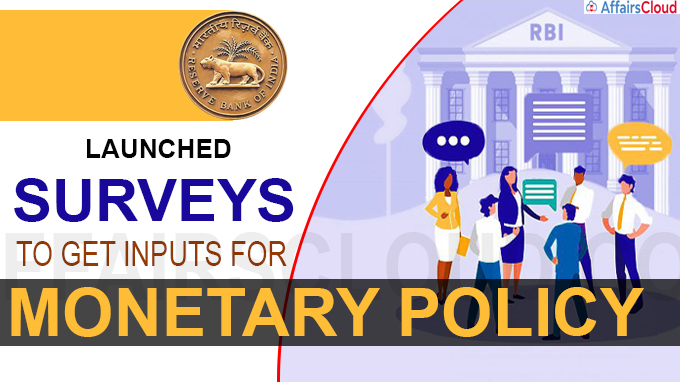 On January 1, 2021, the Reserve Bank of India (RBI) launched the January 2021 round of household surveys namely “Inflation Expectations Survey of Households (IESH)” and “Consumer Confidence Survey (CCS)” to represent inflation expectations and consumer confidence. These surveys will act as useful inputs for RBI’s monetary policy which is scheduled to be announced by Monetary Policy Committee (MPC) on February 3-5, 2021.
On January 1, 2021, the Reserve Bank of India (RBI) launched the January 2021 round of household surveys namely “Inflation Expectations Survey of Households (IESH)” and “Consumer Confidence Survey (CCS)” to represent inflation expectations and consumer confidence. These surveys will act as useful inputs for RBI’s monetary policy which is scheduled to be announced by Monetary Policy Committee (MPC) on February 3-5, 2021.
- It should be noted that both surveys will be conducted by the Mumbai (Maharashtra) based agency, M/s Hansa Research Group Pvt. Ltd., on behalf of the RBI surveys through face-to-face interviews as well as telephonically.
- These surveys are conducted on a regular basis.
About Inflation Expectations Survey of Households (IESH):
This survey covers 6000 households across 18 cities by capturing subjective assessments i.e. qualitative and quantitative responses on price movements and inflation as per the individual’s consumption in the three-month ahead as well as one-year ahead periods.
- The 18 cities are Ahmedabad, Bengaluru, Bhopal, Bhubaneswar, Chandigarh, Chennai, Delhi, Guwahati, Hyderabad, Jaipur, Kolkata, Lucknow, Mumbai, Nagpur, Patna, Raipur, Ranchi and Thiruvananthapuram.
About Consumer Confidence Survey (CCS):
It will cover 5,400 respondents across 13 cities by capturing qualitative responses from households, regarding their sentiments on general economic situation, employment scenario, price level, households’ income and spending.
- The 13 cities are Ahmedabad, Bengaluru, Bhopal, Chennai, Delhi, Guwahati, Hyderabad, Jaipur, Kolkata, Lucknow, Mumbai, Patna and Thiruvananthapuram.
–House Price Index moderated at 1.1% in Q2
In accordance with RBI data, the annual growth (y-o-y) in all-India House Price Index (HPI) remained moderate at 1.1% in Q2FY21 (July-September) as compared to 2.8% in the Q1FY21 and 3.3% in Q2FY20.
- The all-India HPI contracted by (-) 1.1% on a sequential basis (quarter-on-quarter/QoQ) in Q2FY21 in Delhi, Bengaluru, Kolkata and Chennai recorded sequential decline in HPI, whereas in Mumbai it remained around the previous quarter’s level.
- The maximum contraction in HPI was in the case of Chennai at 4.72%, followed by Bengaluru (3.73%).
–Bank credit grows at 5.4% in September quarter:
In accordance with RBI’s “Quarterly Basic Statistical Returns (BSR)-1: Outstanding Credit of Scheduled Commercial Banks (SCBs), September 2020”, Bank credit growth on y-o-y basis stood at 5.4% in Q2FY21 compared to 5.7% growth in the Q1FY21. The Data covered 1,26,580 branches of 89 scheduled commercial banks (excluding Regional Rural Banks) are presented for bank groups, population groups and states.
- Credit growth for metropolitan branches, which have major share in bank credit, decelerated to 3.3% (Y-o-Y) in Q2FY21 as compared to 4.7% in Q1FY21.
- Personal loans, which accounted for one-fourth of bank credit, continued to maintain double-digit growth during September quarter.
- Industrial credit, contracted by 1.7% (y-o-y) and its share in total credit stood at nearly 30% in September quarter 2020.
- Bank loans to private non-financial companies continue to contract y-o-y for the 4th successive quarter and stood at (-)6.7% in Q2FY21.
- Weighted average lending rate (WALR) for outstanding credit declined by 21 basis points during July-September 2020.
Recent Related News:
i.According to a recent Nov. 2020 report of the Reserve Bank of India (RBI), Uttar Pradesh (UP) has been ranked fifth by providing employment under the Micro, Small and Medium Enterprises (MSMEs) during Corona pandemic.
ii.On October 1, 2020, the Reserve Bank of India (RBI) excluded six public sector banks (PSBs) from the Second Schedule of the RBI Act, 1934 following their merger with other banks with effect from April 01, 2020. The six banks are Syndicate Bank, Oriental Bank of Commerce (OBC), United Bank of India, Andhra Bank, Corporation Bank, and Allahabad Bank.
About Reserve Bank of India (RBI):
Formation– 1 April 1935
Governor– Shaktikanta Das
Headquarters– Mumbai, Maharashtra
Deputy Governors– 4 (Bibhu Prasad Kanungo, Mahesh Kumar Jain, Michael Debabrata Patra, and M Rajeswar Rao)



